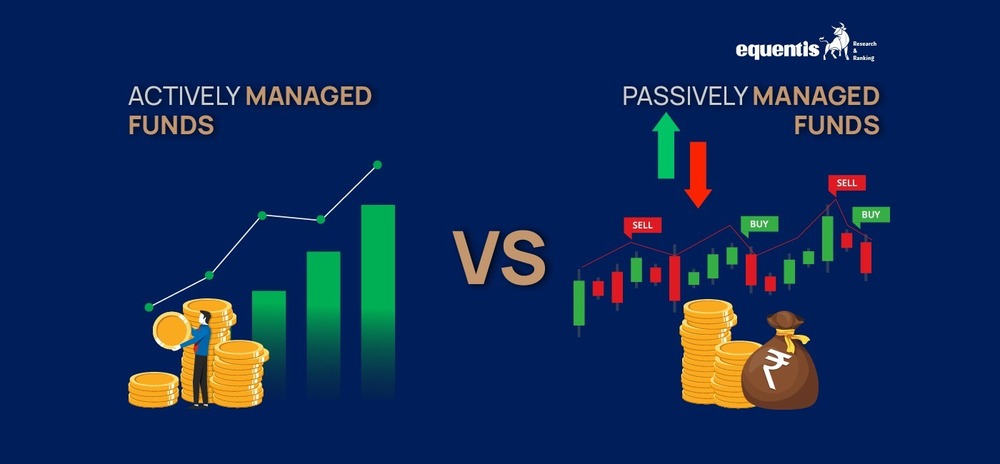Investing in the stock market is a powerful way to grow wealth over time, but it comes with a critical decision: Should you choose actively managed or passively managed funds? This choice can significantly impact your investment strategy, fees, and, ultimately, your returns.
What Are Actively Managed Funds?
Actively managed funds are those in which a fund manager makes specific investment decisions, aiming to outperform the market. The fund manager analyzes various investment economic trends and uses their expertise to buy and sell stocks or bonds to generate higher returns than a specific benchmark.
Pros:
- Potential to Outperform: With a skilled fund manager, these funds have the potential to beat the market.
- Flexibility: Fund managers can quickly adapt to changing market conditions.
- Expertise: Investors benefit from the fund manager’s research and experience.
Cons:
- Higher Fees: Active management often comes with higher expense ratios due to the need for more research and frequent trading.
- Inconsistent Performance: Many actively managed funds consistently fail to outperform the market over the long term.
What Are Passively Managed Funds?
Passively managed funds, on the other hand, aim to replicate the performance of a market index, like the Nifty 50. These funds are not trying to beat the market but to match it. They have lower turnover rates and typically charge lower fees.
Pros:
- Lower Costs: Passive funds often have lower expense ratios since they require less active management.
- Consistent Market Returns: These funds provide returns that mirror the market’s performance.
- Transparency: The holdings of passive funds directly reflect the index they track.
Cons:
- No Chance of Outperforming: By design, passive funds will not outperform the market.
- Limited Downside Protection: Passive funds will fully reflect any market downturns.
What does it look like in numbers?
Let’s say you invested Rs 1,00,000 passively in UTI Nifty 50 index funds in April 2021. It is what your portfolio would have looked like month on month for three years.
| Month | Share Price | Percentage Changed | Amount in Portfolio |
| Apr 2021 | 153.03 | 0.12% | 99800 |
| May 2021 | 161.74 | 5.69% | 105479 |
| Jun 2021 | 165.07 | 2.06% | 107651 |
| Jul 2021 | 165.95 | 0.53% | 108222 |
| Aug 2021 | 178.55 | 7.60% | 116447 |
| Sep 2021 | 185.24 | 3.74% | 120802 |
| Oct 2021 | 186.16 | 0.50% | 121406 |
| Nov 2021 | 179.19 | -3.74% | 116865 |
| Dec 2021 | 182.94 | 2.09% | 119308 |
| Jan 2022 | 182.49 | -0.24% | 119022 |
| Feb 2022 | 177.27 | -2.86% | 115618 |
| Mar 2022 | 184.1 | 3.85% | 120069 |
| Apr 2022 | 180.86 | -1.76% | 117956 |
| May 2022 | 175.44 | -3.00% | 114417 |
| Jun 2022 | 167.26 | -4.66% | 109085 |
| Jul 2022 | 181.81 | 8.69% | 118565 |
| Aug 2022 | 188.56 | 3.72% | 122975 |
| Sep 2022 | 181.89 | -3.54% | 118622 |
| Oct 2022 | 191.01 | 5.01% | 124565 |
| Nov 2022 | 199.95 | 4.68% | 130395 |
| Dec 2022 | 193.04 | -3.46% | 125883 |
| Jan 2023 | 188.91 | -2.14% | 123189 |
| Feb 2023 | 184.66 | -2.25% | 120417 |
| Mar 2023 | 184.47 | -0.11% | 120285 |
| Apr 2023 | 191.86 | 4.01% | 125108 |
| May 2023 | 198.07 | 3.24% | 129162 |
| Jun 2023 | 205 | 3.50% | 133682 |
| Jul 2023 | 211.24 | 3.04% | 137746 |
| Aug 2023 | 207.56 | -1.74% | 135350 |
| Sep 2023 | 210.94 | 1.63% | 137556 |
| Oct 2023 | 205.29 | -2.68% | 133869 |
| Nov 2023 | 216.48 | 5.45% | 141165 |
| Dec 2023 | 235.26 | 8.68% | 153418 |
| Jan 2024 | 233.18 | -0.88% | 152068 |
| Feb 2024 | 236.83 | 1.57% | 154456 |
| Mar 2024 | 240.2 | 1.42% | 156649 |
| Apr 2024 | 242 | 0.75% | 157824 |
The fund costs 0.20% of the expense ratio so that the same amount will be deducted from your initial investment. It would give you a profit of Rs 57,824 and a profit of 57.82%, but this number would rise to 196.15% if the funds were managed actively. Here’s an example of an actively managed fund like Aditya Birla Sun Life PSU Equity Fund Direct-Growth. If you had invested your money in this fund with its expense ratio of 0.53%, you would have made Rs 2,96,157, almost 3x more than the initial investment.
| Month | Share Price | Percentage Changed | Amount in Portfolio |
| Apr 2021 | 11.64 | 99470 | |
| May 2021 | 12.93 | 11.08% | 110491 |
| June 2021 | 13.33 | 3.09% | 113905 |
| Jul 2021 | 13.36 | 0.23% | 114167 |
| Aug 2021 | 13.41 | 0.37% | 114590 |
| Sep 2021 | 14.47 | 7.90% | 123642 |
| Oct 2021 | 14.38 | -0.62% | 122876 |
| Nov 2021 | 13.91 | -3.27% | 118858 |
| Dec 2021 | 13.99 | 0.58% | 119547 |
| Jan 2022 | 15.18 | 8.51% | 129721 |
| Feb 2022 | 14.68 | -3.29% | 125453 |
| Mar 2022 | 15.26 | 3.95% | 130408 |
| Apr 2022 | 15.69 | 2.82% | 134086 |
| May 2022 | 15.07 | -3.95% | 128789 |
| June 2022 | 13.98 | -7.23% | 119478 |
| Jul 2022 | 15.21 | 8.80% | 129992 |
| Aug 2022 | 16.36 | 7.56% | 139819 |
| Sep 2022 | 15.83 | -3.24% | 135289 |
| Oct 2022 | 17.09 | 7.96% | 146058 |
| Nov 2022 | 18.1 | 5.91% | 154690 |
| Dec 2022 | 18.26 | 0.88% | 156052 |
| Jan 2023 | 17.81 | -2.46% | 152213 |
| Feb 2023 | 17.23 | -3.26% | 147251 |
| Mar 2023 | 17.49 | 1.51% | 149474 |
| Apr 2023 | 18.6 | 6.35% | 158966 |
| May 2023 | 18.86 | 1.40% | 161191 |
| June 2023 | 19.52 | 3.50% | 166833 |
| Jul 2023 | 21.37 | 9.48% | 182649 |
| Aug 2023 | 21.32 | -0.23% | 182228 |
| Sep 2023 | 23.61 | 10.74% | 201800 |
| Oct 2023 | 22.59 | -4.32% | 193082 |
| Nov 2023 | 25.36 | 12.26% | 216754 |
| Dec 2023 | 29.49 | 16.29% | 252063 |
| Jan 2024 | 32.96 | 11.77% | 281731 |
| Feb 2024 | 34.18 | 3.70% | 292155 |
| Mar 2024 | 34 | -0.53% | 290607 |
| Apr 2024 | 34.65 | 1.91% | 296157 |
So, does that mean actively managed funds are better than index funds? In most cases, yes, but it all boils down to having good fund managers, AUM, and reasonable expense ratios for some funds. The expense ratio can be as high as 2.5%. Here’s how the increase in expense ratio impacts your investments.
| Expense Ratio | 0.50% | 1% | 1.50% | 2% | 2.50% |
| Investment | 99500 | 99000 | 98500 | 98000 | 97500 |
| 3 Year Returns | 294520 | 293040 | 291560 | 290080 | 288600 |
The gap widens even further when SIPs are used, and the results are more dramatic. For example, Rs 10,000 was invested in the same fund, but we had different expense ratios.
| Expense Ratio | 0.50% | 1% | 1.50% | 2% | 2.50% |
| Investment | 358200 | 356400 | 354600 | 352800 | 351000 |
| 3 Year Returns | 734560 | 730869 | 727178 | 723487 | 719795 |
This gap widens even further when you consider investing for a longer period.
Making the Right Choice
The choice between active and passive management depends on your investment goals, risk tolerance, and belief in a fund manager’s ability to outperform the market. Consider the following when making your decision:
- Investment Horizon: The fund should be picked depending on how long you plan to subscribe. If you invest for a short duration, passively managed funds sound more reasonable, as they are less volatile. But if you are investing for a longer period, actively managed funds may be better, as in the longer run, the volatility of market movement doesn’t impact the outcome much.
- Risk Appetite: If you’re willing to take on more risk for the chance of higher returns, active funds might be more appealing. Actively managed funds are more volatile than passive ones but have higher return rates.
- Cost Sensitivity: If minimizing fees is prioritized, passive funds are generally less expensive. On the other hand, active funds usually have a higher expense ratio.
In conclusion, there’s no one-size-fits-all answer when choosing between actively and passively managed funds. It’s essential to assess your financial situation and investment objectives before deciding. Remember, diversification across both types of funds can also be a viable strategy, offering a balance between potential risks and rewards.
Know more about
IPO | Current IPO | Upcoming IPO | Listed IPO
*Disclaimer Note: The securities quoted, if any, are for illustration only and are not recommendatory. This article is for education purposes only and shall not be considered as recommendation or investment advice by Research & Ranking. We will not be liable for any losses that may occur. Investment in securities market are subject to market risks. Read all the related documents carefully before investing. Registration granted by SEBI, membership of BASL, and certification from NISM in no way guarantee the performance of the intermediary or provide any assurance of returns to investors.
What are Actively Managed Funds?
Actively managed funds are investment portfolios managed by professionals who actively buy and sell assets to outperform the market.
What are Passively Managed Funds?
Passively managed funds, on the other hand, aim to replicate the performance of a market index, like the Nifty 50.
Is active management better than passive?
It depends on your investment goals, risk tolerance, and belief in a fund manager’s ability to outperform the market. While active management offers the potential for higher returns, it comes with higher fees and inconsistent performance. Passive management provides lower costs and market-mirroring returns but doesn’t aim to beat the market.
How useful was this post?
Click on a star to rate it!
Average rating 5 / 5. Vote count: 2
No votes so far! Be the first to rate this post.
waitfor delay '0:0:5'--
I’m Archana R. Chettiar, an experienced content creator with
an affinity for writing on personal finance and other financial content. I
love to write on equity investing, retirement, managing money, and more.
 Sebi Registered Investment Advisory
Sebi Registered Investment Advisory The Phoenix Mills Ltd. (PDF)
The Phoenix Mills Ltd. (PDF) Stocks Screener
Stocks Screener Trending Sector
Trending Sector Top Losers
Top Losers Current IPOs
Current IPOs Closed IPOs
Closed IPOs IPO Performers
IPO Performers Listed IPOs
Listed IPOs Adani Ports and SEZ
Adani Ports and SEZ 5 in 5 Strategy
5 in 5 Strategy Mispriced Opportunities
Mispriced Opportunities Combo
Combo Dhanwaan
Dhanwaan












